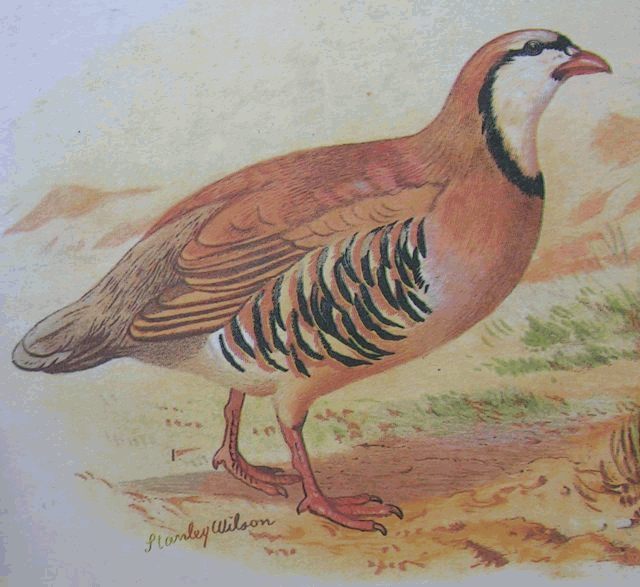Chukar
From Wikipedia, the free encyclopedia
[Photo] Alectoris chukar Picture from Hume and Marshall, Gamebirds of India, Burmah and Ceylon, 1880 Note: This illustration is probably inaccurate.
The Chukar, Alectoris chukar is a Eurasian upland gamebird in the pheasant family Phasianidae of the order Galliformes, gallinaceous birds.
This partridge has its native range in Asia from Pakistan, India and Afghanistan in the east to southeastern Europe in the west, and is closely related and similar to its western equivalent, the Red-legged Partridge, Alectoris rufa. It has been introduced widely, and became established in the United States, Canada, New Zealand and Hawaii. In Great Britain, hybrids between this species and the also introduced Red-legged Partridge are common.
The Chukar is a resident breeder in dry, open, and often hilly country. It nests in a scantily lined ground scrape laying 8 to 20 eggs. Chukars will take a wide variety of seeds and some insects as food; however, Drooping Brome (Cheatgrass) is this species' strong food preference.
The Chukar is a rotund 32-35 cm long bird, with a light brown back, grey breast, and buff belly. The face is white with a black gorget. It has rufous-streaked flanks and red legs. When disturbed, it prefers to run rather than fly, but if necessary it flies a short distance on rounded wings.
It is very similar to Rock Partridge, Alectoris graeca, but is browner on the back and has a yellowish tinge to the foreneck. The sharply defined gorget distinguishes this species from Red-legged Partridge. The song is a noisy chuck-chuck-chukar-chukar.
The Chukar is the National bird of Pakistan and the name is derived from Chakhoor in Urdu.
This species is relatively unaffected by hunting or loss of habitat due to its remote and physically demanding terrain preferences. Its numbers from year to year are most largely affected by weather patterns during the breeding season.
http://en.wikipedia.org/wiki/Chukar
| The text in this page is based on the copyrighted Wikipedia article shown in above URL. It is used under the GNU Free Documentation License. You may redistribute it, verbatim or modified, providing that you comply with the terms of the GFDL. |
|

